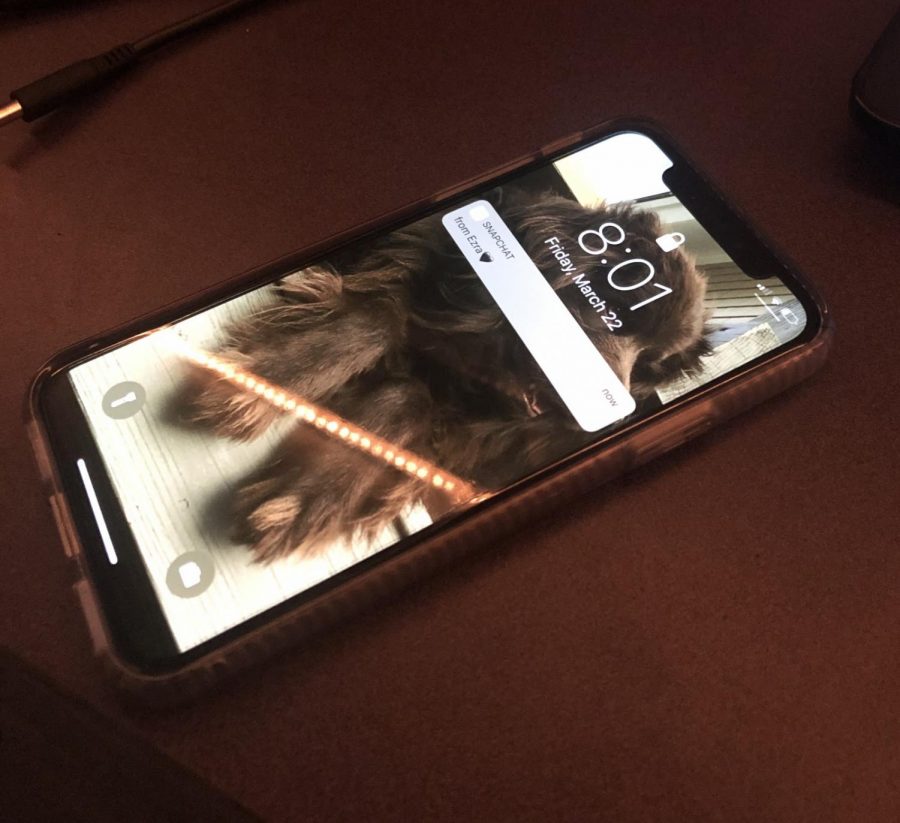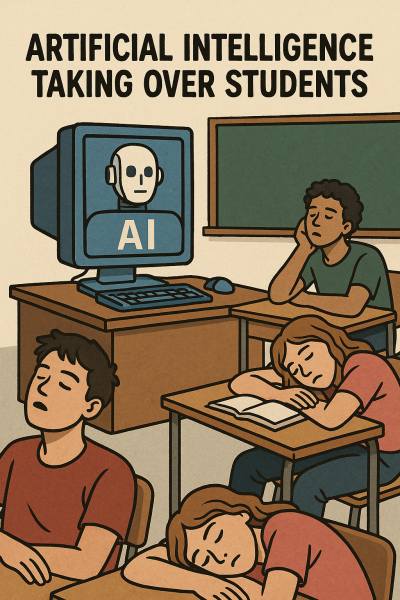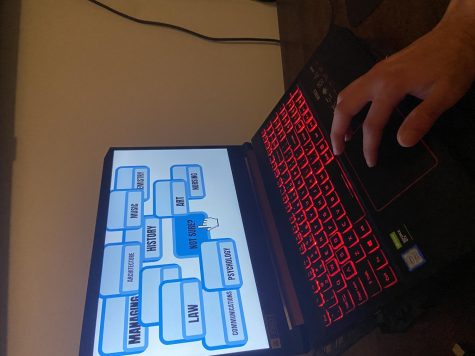Look Up From Your Phone
Do phones help or hurt our social interactions?
A Snapchat notification appears on an unattended phone
Walking down the street, riding on the bus, eating at lunch, sitting in class, no matter where you are, everyone always seems to be looking at their phones instead of each other. Since the release of the iPhone in 2007, smartphones have dramatically changed the social dynamics of all ages, teenagers probably most of all.
According to a survey by the Pew Research Center, almost 95 percent of American teenagers have access to a smartphone, and 45% said they were on it almost constantly. Just look around the room you’re in right now. Odds are there are at least a few people currently on their device, a few more that at least have it out, and probably everyone in that room has at least access to one. More often than not, people are more concerned with those phones than with each other. The constant use and attention to smartphones and the social media that come along with them distract people from “real life.”
Research has shown that phones distract people from what is going on in front of them, even if they are doing something important. A study by the University of Texas at Austin had participants take a test, and had each participant place their phones in different locations. Some were next to them on the desk, some were in their pockets or bag, and some were put in another room entirely. All of the phones were put on silent. The results of the experiment showed that in general, people who had their phones in another room did dramatically better than the subjects who had their phones on their desks. This is because people are becoming dependent on their phones to get through simple, day-to-day activities. With the Internet at our fingertips, we just look up anything we don’t immediately know. This dependence actually hurts our cognitive abilities. In the same study by the University of Texas, the participants were separated based on the levels of dependence they thought they had on their phones. The placement of their phones were randomly assigned (on the desk, pocket, or the other room). The people who had their phones on their desks and were dependent on their phones did the worst on the test.
Phones not only have had a significant impact on our brainpower, they have also deeply impacted our social interactions. Social media has changed the way we hang out, makes plans, and bond with each other. Teen have less of a need to hang out in person, as they can talk and have fun through their phones without having to leave their homes. However, communicating on phones and social media tends to cause unnecessary miscommunications and misunderstandings. Even worse, phones and the internet have caused a disturbing rise in cyberbullying. According to a study cited on StopBullying.org, 15 percent of teenagers in grades 9-12 were cyberbullied 2001. According to more recent statistics from BullyingStatistics.org around half of all teens have been victim or involved in cyberbullying.
Some say that phones are an improvement, because they make communication easier and help people make connections with others online. For people with social anxiety, phones can help them communicate in a way that makes them feel more comfortable. However, people tend to spend so much time making online connections that they ignore making real-life connections. The better people get at socializing on phones, the worse they get at socializing in real life. Phones allow people to communicate easier, but at the same time people often are on their phones while people in real life are trying to communicate with them. While in some situations they improve social interactions, the overall impact of phones on the modern social world has been negative.
Works Cited
“Cyber Bullying Statistics.” Bullying Statistics, 7 July 2015, www.bullyingstatistics.org/content/cyber-bullying-statistics.html.
“Facts About Bullying.” StopBullying.gov, 13 Sept. 2013, www.stopbullying.gov/media/facts/index.html#ftn17.
“Journal of the Association for Consumer Research.” The University of Chicago Press: Journals, 3 Apr. 2017, www.journals.uchicago.edu/doi/abs/10.1086/691462.
“Teens, Social Media & Technology 2018.” Pew Research Center: Internet, Science & Tech, 30 Nov. 2018, www.pewinternet.org/2018/05/31/teens-social-media-technology-2018/.

Sam Bell is a junior at Triton. Yay, or something. He works at the Frisky Dog and TWS. He also kind of likes photography, videography, reading, writing,...










